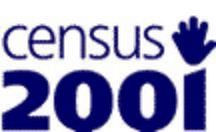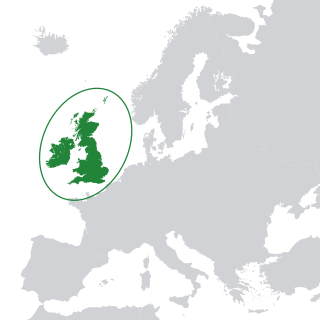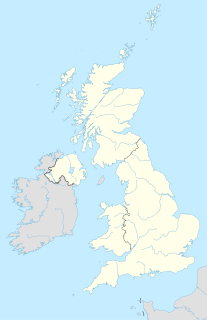
The British Isles are a group of islands in the North Atlantic off the north-western coast of continental Europe that consist of the islands of Great Britain, Ireland, the Isle of Man, the Hebrides and over six thousand smaller isles. They have a total area of about 315,159 km2 and a combined population of almost 72 million, and include two sovereign states, the Republic of Ireland, and the United Kingdom of Great Britain and Northern Ireland. The islands of Alderney, Jersey, Guernsey, and Sark, and their neighbouring smaller islands, are sometimes also taken to be part of the British Isles, even though, as islands off the coast of France, they do not form part of the archipelago.

According to the 2011 census, the total population of the United Kingdom was around 63,182,000. It is the 21st-most populated country in the world. Its overall population density is 259 people per square kilometre, with England having a significantly higher population density than Wales, Scotland and Northern Ireland. Almost one-third of the population lives in England's southeast, which is predominantly urban and suburban, with about 9 million in the capital city of London, the population density of which is just over 5,200 per square kilometre.

The administrative geography of the United Kingdom is complex, multi-layered and non-uniform. The United Kingdom, a sovereign state to the northwest of continental Europe, consists of England, Northern Ireland, Scotland and Wales. For local government in the United Kingdom, England, Northern Ireland, Scotland and Wales each have their own system of administrative and geographic demarcation. Consequently, there is "no common stratum of administrative unit encompassing the United Kingdom".
Anglo-Celtic Australians are Australians whose ancestors originate wholly or partially in the countries of England, Wales, Scotland and Ireland.

English, in various dialects, is the most widely spoken language of the United Kingdom, however there are a number of regional languages also spoken. There are 14 indigenous languages used across the British Isles: 5 Celtic, 3 Germanic, 3 Romance, and 3 sign languages. There are also many immigrant languages spoken in the British Isles, mainly within inner city areas; these languages are mainly from South Asia and Eastern Europe.

A nationwide census, known as Census 2001, was conducted in the United Kingdom on Sunday, 29 April 2001. This was the 20th UK census and recorded a resident population of 58,789,194.

The Welsh are a Celtic nation and ethnic group native to, or otherwise associated with, Wales, Welsh culture, Welsh history and the Welsh language. Wales is a country that is part of the United Kingdom, and the majority of people living in Wales are British citizens.
A one-name study is a project researching a specific surname, as opposed to a particular pedigree or descendancy. Some people who research a specific surname may restrict their research geographically and chronologically, perhaps to one country and time period, while others may collect all occurrences world-wide for all time.

The terminology of the British Isles refers to the various words and phrases that are used to describe the different geographical and political areas of the islands of Great Britain, Ireland, and the smaller islands which surround them. The terminology is often a source of confusion, partly owing to the similarity between some of the actual words used, but also because they are often used loosely. In addition, many of the words carry both geographical and political connotations which are affected by the history of the islands.

Coincident full censuses have taken place in the different jurisdictions of the United Kingdom every ten years since 1801, with the exceptions of 1941 and Ireland in 1921. Simultaneous censuses were taken in the Channel Islands and the Isle of Man, with the returns being archived with those of England. In addition to providing detailed information about national demographics, the results of the census play an important part in the calculation of resource allocation to regional and local service providers by the governments of both the UK and the European Union. The most recent UK census took place in 2011.
The United Kingdom Census of 1841 recorded the occupants of every United Kingdom household on the night of 6 June 1841. The enactment of the Population Act 1840 meant a new procedure was adopted for taking the 1841 census. It was described as the "first modern census" as it was the first to record information about every member of the household, and administered as a single event, under central control, rather than being devolved to a local level. It formed the model for all subsequent UK censuses, although each went on to refine and expand the questions asked of householders.
The United Kingdom Census of 1851 recorded the people residing in every household on the night of Sunday 30 March 1851, and was the second of the UK censuses to include details of household members. However, this census added considerably to the fields recorded in the earlier 1841 UK Census, providing additional details of ages, relationships and origins, making the 1851 census a rich source of information for both demographers and genealogists.

A nationwide census, commonly known as Census 1991, was conducted in the United Kingdom on Sunday 21 April 1991. This was the 19th UK census.
The Census of Ireland, 1911, was a census that covered Ireland, and was conducted on Sunday 2 April 1911 as part of a broader Census of the United Kingdom. A census of Ireland had taken place every ten years beginning in 1821 until 1911. The next census did not take place until 1926 due to the Irish War of Independence and subsequent Irish Civil War. The entire returns for all 32 counties are available online on the website of the National Archives of Ireland.

Great Britain is an island in the North Atlantic Ocean off the northwest coast of continental Europe. With an area of 209,331 km2 (80,823 sq mi), it is the largest of the British Isles, the largest European island, and the ninth-largest island in the world. In 2011, Great Britain had a population of about 61 million people, making it the world's third-most populous island after Java in Indonesia and Honshu in Japan. The island of Ireland is situated to the west of Great Britain, and together these islands, along with over 1,000 smaller surrounding islands, form the British Isles archipelago.

The United Kingdom (UK) comprises four countries: England, Scotland and Wales and Northern Ireland.

A census of the population of the United Kingdom is taken every ten years. The 2011 census was held in all countries of the UK on 27 March 2011. It was the first UK census which could be completed online via the Internet. The Office for National Statistics (ONS) is responsible for the census in England and Wales, the General Register Office for Scotland (GROS) is responsible for the census in Scotland, and the Northern Ireland Statistics and Research Agency (NISRA) is responsible for the census in Northern Ireland.
The UK Statistics Authority announced on 27 March 2014 that it has recommended to the United Kingdom Government that the next census in England and Wales should take place in 2021, a decade after the previous census in March 2011. The National Records of Scotland (NRS) also reported on the same date that it was proposing to the Scottish Government that a census in Scotland should also take place in 2021. A further detailed plan was published by NRS on 27 September 2018. In October 2014 the Northern Ireland Statistics and Research Agency (NISRA), which is responsible for the census in Northern Ireland, published its proposals to conduct a census in 2021. These announcements followed on from a series of co-ordinated research projects known collectively as the Beyond 2011 Programme.
The United Kingdom Census 1911 of 2 April 1911 was the 12th nationwide census conducted in the United Kingdom of Great Britain and Ireland. The total population of the United Kingdom was approximately 45,221,000, with 36,070,000 recorded in England and Wales, 4,761,000 in Scotland, and 4,390,000 in Ireland.
The United Kingdom Census 1931 was a census of the United Kingdom of Great Britain and Northern Ireland that was carried out on 26 April 1931. No census was taken in Northern Ireland. It was the first to ask about usual place of residence.


















